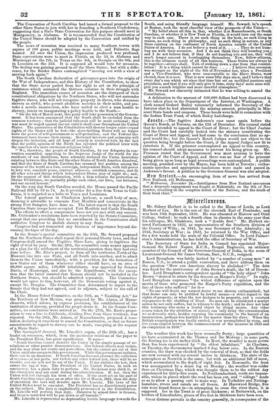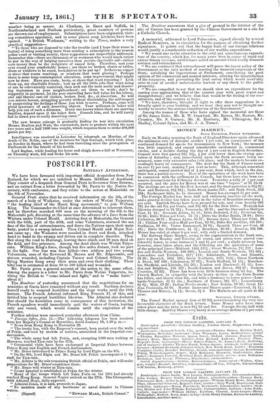311torrIlaumo.
Mr. Sidney Herbert is to be called to the House of Lords, as Lord Herbert of Lea. He is the son of the eleventh Earl of Pembroke, and was born 16th September, 1810. He was educated at Harrow and Oriel College, Oxford ; he took a fourth class in classics in the same year that his colleague, Mr. Gladstone, took a " double first." Mr. Herbert en- tered Parliament in 1832, as representative of the Southern division of the County of Wilts ; in 1841, he was Secretary of the Admiralty ; in 1845, Secretary at War ; in 1852, he returned to the War Office, and for a few weeks held the seals of the Colonial Office. In Lord Palmer- ston's Administrations, he has held the office of Secretary of War.
The Secretary of State for India in Council has appointed Major- General Sir Robert Napier, K.C.B., Bengal Engineers, an ordinary member of the Council of the Governor-General of India, in the room of Lieutenant-General Sir James Outram, Bart., G.C.B., resigned.
Lord Brougham was lately invited by "a number of young men" at Boston, U.S., to attend a public convention, and there address them on the question "How can American slavery be abolished ?" The date was fixed for the anniversary of John Brown's death, the 3d of Decem- ber. Lord Brougham's correspondent speaks of "the holy object" John Brown "desired to attain by his descent on Harper's Ferry." In reply, Lord Brougham expresses " the widest difference of opinion upon the merits of those who promoted the Harper's Ferry expedition, and the fate of those who suffered" for it—
"No one will doubt my earnest desire to see slavery extinguished ; but that desire can only be gratified by lawful means—a strict regard to the rights of property, or what the law declares to be property, and a constant repugnance to the shedding of blood. No man can be considered a martyr unless he not only suffers, but is witness to the truth ; and he does not bear this testimony who seeks a lawful object by illegal means. Any other course taken for the abolition of slavery can only delay the consummation we so devoutly wish, besides exposing the community to the hazard of an insurrection, perhaps less hurtful to the master than.the slave. When the British emancipation was finally carried, it was accomplished by steps, and five years elapsed between the commencement of the measure in 1833 and its completion in 1838."
The weather this week has been unusually frosty ; large quantities of ice have accumulated in the Thames and the Medway ; in some parts; the floating ice is six inches thick. In Kent, the weather is more severe than has been experienced by " the oldest inhabitant." At Chatham, on Tuesday, the thermometer marked 6 deg. below zero. In the Eastern counties, the thaw was checked by the renewal of frost, so that the fields are now covered with ice several inches in thickness. The state of the atmosphere at Norwich is the same, but with an additional fall of snow, which accumulated to the depth of eight feet. In Newcastle, the frost was accompanied by a dense fog on Monday ; the weather was colder than on Christmas Day, which was thought there to be the coldest day experienced for thirty-five years. In Northumberland, roads are impass- able, unless in places where the road has been cut, and " sidings" made so as to allow a passing cart to make way. In Yorkshire and Notting- hamshire, rivers and canals are all frozen. At Harewood Bridge, five rats were found frozen in—in attempting to cross the river there, it is supposed. Ice in the Trent is of great thickness ; at Butterwick, on the borders of Lincolnshire, pieces of five feet in thickness have been seen. •
Great distress prevails in the country generally, in consequence of the weather being so severe. At Chatham, in Essex and Suffolk, in Northumberland and Durham particularly, great numbers of persons are thrown out of employment. Subscriptions have been originated, visit- ing committees appointed, and in some places soup kitchens have been opened. "A British Workman," writing to the Times, makes a very practical suggestion- " To those who are disposed to take the trouble (and I hope their name is legion) of doing something more than sending a subscription to the nearest police court or visiting society, these suggestions are respectfully addressed. Remember this—there are thousands of us workmen who would much rather be put in the way of helping ourselves than receive charitable aid—rather earn money than be the recipients of casual help. Therefore, cast your eyes round your comfortable 'homes ; are there no broken chairs or tables, doors or windows to be eased, bookshelves to be put up ? Is there no copper or stove that wants resetting, or windows that want glazing ? Perhaps there is some long-contemplated alteration, some improvement that might now be done. Have you coats, boots, or shoes that want repairing ? Look them up, my charitable friends ; look up all the little jobs that want doing or can be conveniently contrived, then seek out the most needy and deserv- ing tradesmen in your neighbourhood ; set them to work ; don't be niggardly in payment, let the poor starveling have full value for his labour, and add thereto cast-off clothes, broken food, &c., at discretion. So will you relieve honest, struggling poverty without diminishing the self-respect or pauperizing the feelings of those you wish to serve. Perhaps, some will plead ignorance of such deserving objects. Your milkman or baker will help you out of such a dilemma. If any one knows where there are starving families, depend upon it the baker does. Consult him, and he will rarely fail to direct you to really deserving cases."
The new bronze coinage is gradually finding its way into circulation Messrs. Boulton and Watt, the contractors, have to produce within the next two years and a half 1800 tons weight, which requires them to strike 400,000 pieces per day.
Intelligence was received in Leicester by telegraph on Monday, of the death of Dr. Noble, one of the members for that borough, which took place on Sunday in Spain where he had been travelling since the prorogation of Parliament for the Lenefit of his health.
Lord Raglan, while leading his horse and sleigh down a hill at Worcester, on Thursday week, fell and broke his arm.



























 Previous page
Previous page